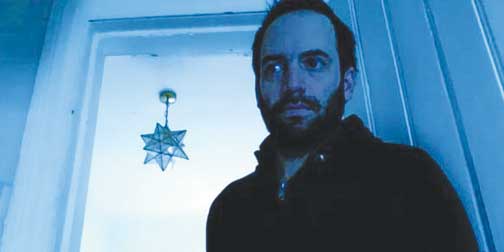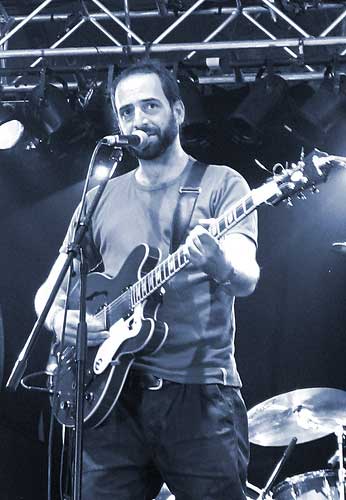


SERVICES
Tuesday October 6, 2009
Breaking Out
By Joe Kavanagh Many years ago, a friend contacted me and asked if I wanted to go catch a band, who were reforming for a one-off show almost a decade after their breakup. The group were from a tiny town in Ireland, and initially all but unknown outside their friends and family, but they did eventually manage to make waves locally before dissolving when their drummer - and main songwriter - immigrated for pastures new in the States. Like some tanned apparition of health, he sat behind the kit on the night in question as the briefly resurrected band belted out tunes to a partisan crowd of enthusiastic onlookers. Listening to the surprisingly high-quality set, I remember feeling a tinge of sadness, due to the fact that this performance would undoubtedly mark the death of those songs, as the drummer was leaving only days later to resume his life in America, leaving any aspirations that he ever had for his music behind him. While affordable home recording equipment now means that original music often outlives the acts that create it, I am still struck by this peculiar feeling of gloom when I happen across a good original Irish act, as most fight an almost daily battle against oblivion. Given that file-sharing has all but wiped out album sales as a source of income, acts are more reliant than ever on money earned from gigging, but unlike their counterparts in the US, UK or on the continent, Irish bands do not have the luxury of a lucrative live market on their doorstep with which to fund their musical ambitions. This essentially means that they are faced with the stark prospect of either cracking overseas markets, or folding, if they intend to seriously pursue a career in music; no small order given the prohibitive costs of shipping equipment and band members across seas or oceans. Every year, I am filled with a sense of sadness when I see another Irish act fail, not because they weren't good enough, but simply because they did not have access to overseas markets, so it pleased me greatly when I recently read that Adrian Crowley had just signed an international recording contract, which will give this modest man of substantial talent at least a puncher's chance of getting to the big dance. Born in Malta, the son of a Maltese mother and Irish father, Crowley's family lived a peripatetic existence before settling in Connemara, County Galway, a place which offered its own barriers despite the obvious warmth of its stunning countryside. While the region's somewhat insular manner attracts some to the area, this same trait can prove a touch intimidating for some who chose to make it home. This notion of being an outsider was further reinforced in a childhood that saw him introduced as "Adrian from Malta" to his new schoolmates, leaving him with the impression that he was "less than fully Irish" and causing him to withdraw further into his own world. He is the first to point out, however, that his childhood was certainly not an unhappy one, just tinged with the sense of being an interloper, exacerbated by his indifference towards sports, in a county that is palpably sports mad. Instead, he found solace in books or in his own words, which he would readily scribble into notebooks as he sat far from the madding crowd, alone with his thoughts and dreams. Upon leaving school to study architecture in Dublin, the path to his current career became evident upon moving in with a musician friend who was something of a fixture on the local scene. Often times, their apartment would be packed with musicians, and Crowley eventually began to partake in the free-for-all sessions that were an almost nightly occurrence. His initial curiosity soon transformed into an all-consuming passion for music, and he eventually summoned up the courage to play his first live gig, to the lunchtime crowd in Trinity College. Something of a watershed moment, it proved that he could actually perform to strangers, and after a year spent living in France, he returned with a clutch of demos that became his first album, A Strange Kind, which he hawked around with no distribution or promotion. For his follow-up he traveled to America to work with acclaimed producer, Steve Albini, laying down all the tracks in five days, giving the songs an inherent rawness and sense of spontaneity. Its title, When You Are Here You Are Family, was inspired by a piece of graffiti he noticed on a wall in New York, and it garnered enough interest to see him tour around the US and Europe with the likes of Scottish underground kingpins, King Creosote and James Yorkston, of Fence Records who would eventually release his work in the UK. In 2004, he returned with A Northern Country, an album that was recorded almost entirely in his sister's house, again showing enough promise to secure him opening slots with similar minded artists like Badly Drawn Boy and Jose Gonzalez. In between all of these musical movements, he also took the time out to marry Nathalie, who had been working in Dublin as a French au-pair and the couple have since had one child together.
Modest Star In The Making: Adrian Crowley Crowley is on record praising his wife for her undying support and encouragement, and the fact that she realized from the very start that there would effectively be three people in the marriage, the two of them and his muse. His sister's house once again became the "recording studio" for his next album, as he and the aforementioned Yorkston, spent five days getting the bulk of the recording done. This time however, he paid more attention to the nuances and arrangements of melodies, vocals and instruments, and spent the ensuing weeks repeatedly returning to the recordings to add a brush stroke here and a flourish there, until he was entirely happy with the result. Whatever the formula, it became immediately apparent that this was something special indeed when Long Distance Swimmer, arrived on shelves in the latter part of 2007. Melancholic without being truly maudlin, chock-full of imagery and imagination without a hint of pretension, and packed with songs that offer instant aural gratification the album offered one of the year's musical highlights. Achingly beautiful, utterly honest and wholly engaging, it deservedly received a nomination for the Choice Music Prize, and has since been held up as something of a high-water mark amongst modern Irish singer/songwriters. With his profile suddenly rising fast, he once again took to the road, taking in a clutch of festivals throughout Europe, and touring with the likes of Devon Sproule, Vetiver and the Silver Jews. This summer he returned with his most sonically ambitious work to date in the form of Season Of The Sparks, which was released on his own Tin Angel Records imprint. Recorded with producer Stephen Shannon (member of celebrated Irish band Halfset), the album represents an evolution in his sound that sees him move away from the stricter confines of traditional singer/songwriter constraints, without sacrificing any of the intimacy, nuance and soul that makes his work so compelling. Of his approach to making the album, he recently told an interviewer: "If I'm going to be satisfied with it, it has to satisfy these different, I wouldn't say parameters because that's very cold but it can't be a case of just words fitting into the spaces lent by the music. For me it has to have a sense of fulfillment on the different levels, not just on the music side. I think I might have a little bit of an obsession with having the words stand alone and I wouldn't be happy if it didn't work like that as well." Innovative, emotive and ultimately uplifting, Season Of The Sparks offers progressive proof of a songwriter whose musical craft and ambition will ultimately drive him to develop with every release. At least as impressive are Crowley's lyrics, capable of standing alone such is their poetic bent and subtle interplay, where words are stitched seamlessly together to paint vivid pictures and emotions. The record has only reinforced his reputation as a songwriter of note and further enhanced his profile at home and abroad. Indeed, such is his burgeoning reputation that he was snapped up by Scottish label, Chemikal Underground, who intend to give his latest album a global release next month, and in a recent interview with Rolling Stone magazine, acclaimed American singer, Ryan Adams named Crowley as the best artist that people had never heard of. It all bodes well for a future that looks to be charting a course toward the bright lights of international recognition. Sadly, his career is currently on temporary hold after he was the victim of a savage beating three weeks back, which occurred while he was withdrawing cash from an ATM machine in Dublin. Struck on the head with a bottle and beaten relentlessly while on the ground, the incident left him with serious head-injuries, but thankfully, he will soon be ready to resume his march toward a future that looks very bright indeed. To paraphrase the legendary late-football manager, Brian Clough: I wouldn't say Adrian Crowley's the best of Ireland's current singer/songwriters. But he's in the top one. |
CURRENT ISSUE

RECENT ISSUES


SYNDICATE
[What is this?]
POWERED BY

HOSTED BY

Terms of Service | Privacy Policy
Website Design By C3I







